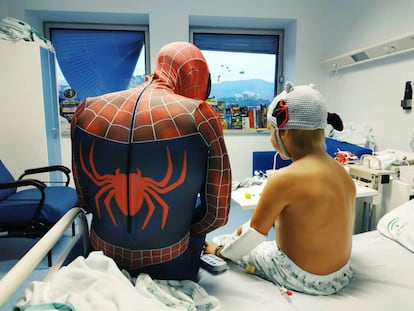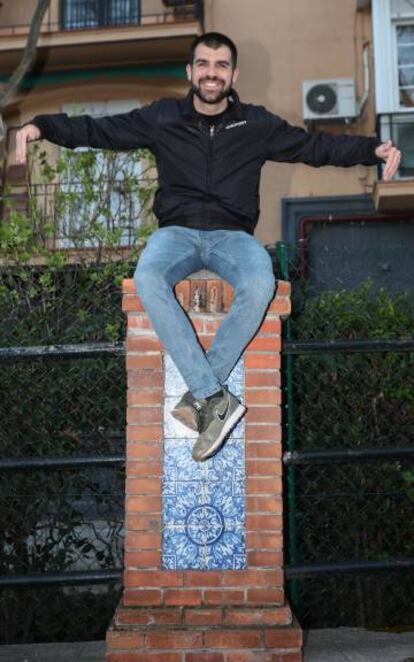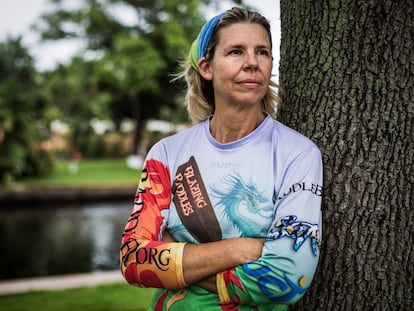Meet the real-life superhero helping sick kids in Spain
Police officer Eduardo Balboa del Cid talks to EL PA?S about why he spends his free time entertaining children in cancer wards and in palliative care


Eduardo Balboa del Cid is the stage name of a 29-year-old Spaniard committed to helping others. When he is not working as a police officer in the traffic unit at Madrid¡¯s Atocha station, he spends his free time playing with children in the oncology ward. For kids that are in palliative care, he dresses up as Spider-Man.
Question. How did you start working with children with cancer?
Answer. Seven years ago I started visiting a foundation as a volunteer. I went four times a week. I discovered I was good at it, and started visiting these children in hospitals, creating closer ties. The parents kept my phone number and we formed a relationship that kept growing. Now I spend all my free time on this.
Q. And how do they get in touch with you?
A. I receive message from parents who have children in hospital. I also go when the children are in palliative care. I do home visits until the child passes away, I help them die without fear.
Q. How many of those cases have you seen? How do you deal with it?
A. At the moment, 37. It¡¯s a very hard job because being in contact with death is not something we¡¯re prepared for. Society hides death and treats it like a taboo. At the beginning, it is very difficult. Seeing any person die is hard, let alone a child.
Q. Has any case particular affected you?
A. All cases stay with you. What is striking is that the children are always ready to go. An adult is more attached to life than a child. If the children no longer feel their parents¡¯ own projected fear of seeing them go, they will die peacefully. There was this one case of an immigrant child whose parents were in an irregular legal status and were waiting to be deported from the country once their child died. This little five-year-old clung to life, he didn¡¯t want to die even when he was sedated, because he knew his parents would have to leave Spain.

Q. What do you feel when you are with the children?
A. In those moments, I¡¯m a kid again ¨C it¡¯s as if I am their older brother. I¡¯m always learning from them. It also depends on what they want. Sometimes they are tired and they don¡¯t want to do anything. Other days they¡¯re like a force of nature, and just want to play PlayStation or paint.
Q. We¡¯ve spoken about death, but there is also life.
A. Of course. There are many children who recover and you see them later with their hair grown back and going to school. When I see them returning to the life of a child, it¡¯s very beautiful. It¡¯s like having a little fish and letting it go into the sea. I keep in touch with all of them, and also with the parents of the children who have passed away.
Q. How did the Spider-Man costume come about?
A. I do it all over Spain. One day I was watching TV and a story come on about a father in the United States who dressed up as Spider-Man to surprise his son who was in palliative care. This is where the idea to buy the costume and wear it to visit children in oncology units in Spain came from.?
Q. Do you wear the costume a lot in Madrid?
A. I wear it most often at the Ni?o Jes¨²s Hospital and the 12 de Octubre Hospital. I do it fairly regularly. A parent will call me and I¡¯ll put it on. The parents deal with asking for permission and speaking with the doctors.
Q. Is it difficult to put on a smile for a child who is about to die?
A. I don¡¯t put on a smile, I have one. Everyone is used to the birth of a child, but not their death. No one prepares us to face death.
Q. How do you balance this with your work as a policeman?
A. They are two things that go hand in hand. In both jobs, I help others. In one, I do so professionally and in the other, altruistically. At the end of the day, I became a policeman to help people.
Q. Would you like to have your own foundation?
A. No, because I don¡¯t like things that tie me down. To have a foundation, you need to be politically correct and I am one of those people who always says what they think. What makes me happy is playing with children.
A police officer with tattoos
Eduardo Balboa del Cid's arms are covered with two different tattoos. On the right arm, there is a depiction of death as envisioned by film director Tim Burton. And on the left arm, rendered more colorfully, is a tattoo of a fight between superheroes and villains. "The babies are the ones who get the most excited when I show them [my tattoos] and when they touch them with their little hands," says del Cid.
English version by Asia London Palomba.
Tu suscripci¨®n se est¨¢ usando en otro dispositivo
?Quieres a?adir otro usuario a tu suscripci¨®n?
Si contin¨²as leyendo en este dispositivo, no se podr¨¢ leer en el otro.
FlechaTu suscripci¨®n se est¨¢ usando en otro dispositivo y solo puedes acceder a EL PA?S desde un dispositivo a la vez.
Si quieres compartir tu cuenta, cambia tu suscripci¨®n a la modalidad Premium, as¨ª podr¨¢s a?adir otro usuario. Cada uno acceder¨¢ con su propia cuenta de email, lo que os permitir¨¢ personalizar vuestra experiencia en EL PA?S.
?Tienes una suscripci¨®n de empresa? Accede aqu¨ª para contratar m¨¢s cuentas.
En el caso de no saber qui¨¦n est¨¢ usando tu cuenta, te recomendamos cambiar tu contrase?a aqu¨ª.
Si decides continuar compartiendo tu cuenta, este mensaje se mostrar¨¢ en tu dispositivo y en el de la otra persona que est¨¢ usando tu cuenta de forma indefinida, afectando a tu experiencia de lectura. Puedes consultar aqu¨ª los t¨¦rminos y condiciones de la suscripci¨®n digital.










































